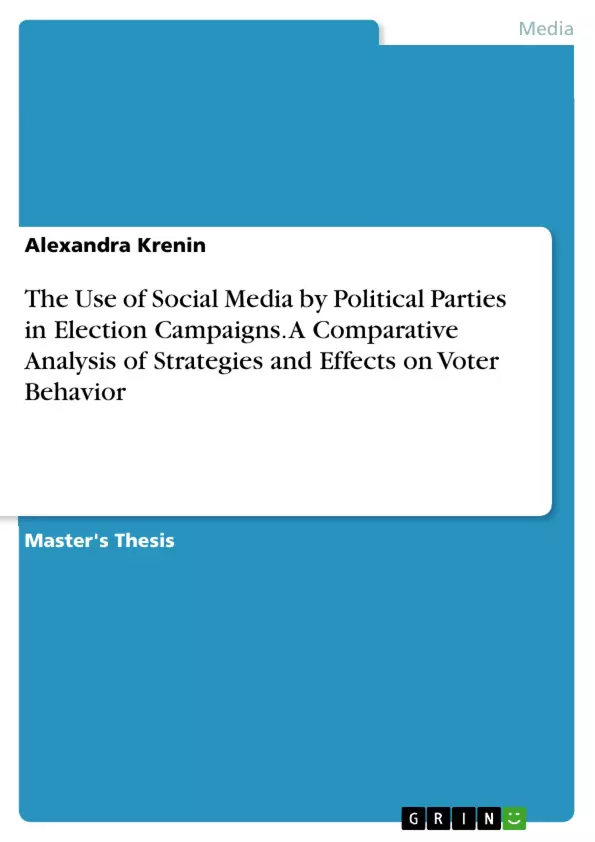This master thesis examines the use of social media by the most important political parties in election campaigns. Strategies and their effects on voter behavior are examined with the help of a comparative analysis. The study covers various social media platforms (Facebook, YouTube, TikTok, Instagram, X) and analyzes how parties use these channels to spread their messages, mobilize voters and influence political discourse. Using qualitative methods, in particular through interviews, it is investigated to what extent the social media strategies of the parties shape the opinion of voters and influence their voting decisions. The results of this study are intended to contribute to a better understanding of the role of social media in modern political election campaigns and to analyze how digital communication strategies change voting behavior and the use of social media by politicians.
Inhaltsverzeichnis (Table of Contents)
- 1. Introduction
- 1.1 Problem and literature research
- 1.2 Methods chapter
- 2. Theoretical framework
- 2.1 Importance of social media in election campaigns
- 2.2 Platform-specific features
- 2.3 General Strategies and Tactics
- 2.4 Effects on political communication
- 2.5 Critical assessment of the importance of social media for politics
- 3. Media impact models
- 3.1 Spiral of silence
- 3.2 Echo Chamber Effect
- 3.3 The Filter bubble
- 4. Comparative analysis of strategies on different platforms
- 4.1 DIE GRÜNEN
- 4.2 SPD
- 4.3 CDU
- 4.4 AfD
- 4.5 DIE LINKE
- 4.6 FDP
- 5. Methodological approach
- 5.1 Qualitative research method
- 5.2 Guided interviews and transcription
- 5.3 Data Evaluation
- 6. Presentation and interpretation of results
- 6.1 Meaning and Goals of Social Media Use
- 6.2 Strategies and content on social media
- 6.3 Effects on voter behaviour
- 6.4 Differences and similarities
- 6.5 Influence on image and credibility
Zielsetzung und Themenschwerpunkte (Objectives and Key Themes)
This master's thesis aims to analyze the use of social media by major political parties during election campaigns, comparing their strategies and assessing the impact on voter behavior. The study employs qualitative methods, specifically interviews, to understand how social media shapes voter opinions and influences voting decisions. The findings will contribute to a better understanding of social media's role in modern political campaigns and how digital communication strategies affect voting behavior.
- Social media strategies employed by political parties during election campaigns.
- The impact of social media on voter behavior and opinion formation.
- A comparative analysis of strategies across different social media platforms.
- The influence of social media on the image and credibility of political parties.
- The effects of social media on political communication.
Zusammenfassung der Kapitel (Chapter Summaries)
Chapter 1 introduces the research problem and relevant literature, outlining the methodology. Chapter 2 establishes a theoretical framework, exploring the importance of social media in election campaigns, platform-specific features, general strategies and tactics, effects on political communication, and a critical assessment of social media's role in politics. Chapter 3 examines media impact models, including the spiral of silence, echo chamber effect, and filter bubble. Chapter 4 provides a comparative analysis of the social media strategies of several major political parties (DIE GRÜNEN, SPD, CDU, AfD, DIE LINKE, and FDP) across different platforms. Chapter 5 details the methodological approach, focusing on the qualitative research methods, guided interviews, transcription, and data evaluation. Chapter 6 presents and interprets the results, examining the meaning and goals of social media use, strategies and content, effects on voter behavior, differences and similarities between parties, and influence on image and credibility.
Schlüsselwörter (Keywords)
Social media, political parties, election campaigns, voter behavior, qualitative research, comparative analysis, political communication, digital strategies, media impact models, DIE GRÜNEN, SPD, CDU, AfD, DIE LINKE, FDP, Facebook, YouTube, TikTok, Instagram, X.
- Quote paper
- Alexandra Krenin (Author), 2024, The Use of Social Media by Political Parties in Election Campaigns. A Comparative Analysis of Strategies and Effects on Voter Behavior, Munich, GRIN Verlag, https://www.grin.com/document/1509962



